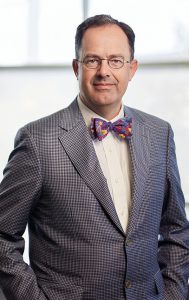UM faculty, staff, learners and alumni have much to be proud of as the Rady Faculty of Health Sciences continues its unprecedented growth in 2025.
As I’ve shared in past issues, we have been partnering closely with the Government of Manitoba to help address our province’s health workforce shortfalls. The government has shown its utmost confidence in our expertise to implement generational expansions across the Rady Faculty.
This growth in educational capacity comes at a critical time. The province faces an increasing gap between the needs of the population and the number of practising physicians, nurses, physician assistants, occupational therapists (OTs), physical therapists (PTs) and respiratory therapists (RTs).
In fall 2024, 140 students entered first-year medicine, making the MD Class of 2028 the largest Max Rady College of Medicine class in University of Manitoba history (an increase of 30 seats over the last two years).
As well, the master of physician assistant studies (MPAS) program doubled in size, admitting 30 students in 2024.
Over the past three years, UM’s total number of postgrad residency positions has increased from about 139 positions per year to 188 positions in the coming intake on July 1, 2025. This includes an additional 30 family medicine residency positions, 14 specialty, five psychiatry and two clinical health psychology positions.
In the College of Rehabilitation Sciences, the RT program has doubled from 20 to 40 seats for the fall 2025 intake. The OT and PT programs are expanding to 60 seats per program, starting in fall 2025.
In the College of Nursing, enrolment increased by 120 seats – from 280 to 400 – in the bachelor of nursing program in May 2023.
Nurse practitioner seats have increased to 35. As well, the College of Nursing’s midwifery program, launched in 2021, has expanded from six to eight seats.
Our colleagues in dentistry and pharmacy are also enhancing their programs. The Dr. Gerald Niznick College of Dentistry has expanded opportunities for dentistry and dental hygiene students beyond the Perimeter, including northern clinical rotations in Churchill, Man.
With the introduction of the new PharmD program in 2019, the College of Pharmacy has greatly increased its in-the-field training – from 640 hours to 1,600 hours. It has also expanded beyond the city, with 25 of the 92 training sites located outside Winnipeg, including in Churchill, Norway House and Beausejour, Man.
The success and sustainability of our expanded programs rely on UM clinical faculty, preceptors and educational facilitators (many of whom are alumni) stepping up to train the next generation of health-care leaders.
Thank you to all the dedicated health professionals who give back to UM and prepare our learners and residents to become competent, caring and ethical practitioners.
As we get set to welcome our sixth college, the College of Community and Global Health (read more on pages 16-17), I am excited to see how it will address complex health issues, reducing inequities and improving health and well-being both locally and globally.
It is a true privilege to be part of the exceptional team at the Rady Faculty of Health Sciences as we strive to make our programs relevant and responsive to health-care needs, across the province and beyond.

Peter Nickerson [B.Sc.(Med.)/86, MD/86]
Vice-Provost (Health Sciences) & Dean,
Rady Faculty of Health Sciences, University of Manitoba
